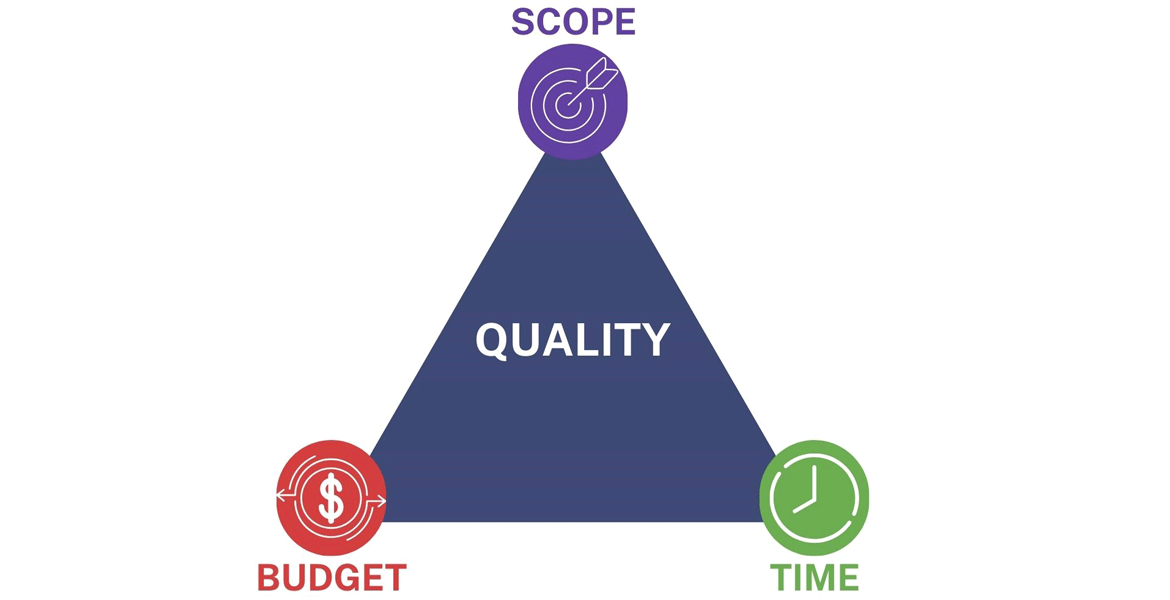According to the Project Management Institute (PMI), the demand for project managers is on the rise globally. In their report, “Project Management Job Growth and Talent Gap” they state that between 2017 and 2027, the need for project-oriented workers in various industries is expected to increase by almost 33 million positions.
The data speaks for itself — project management is a field with a bright future and a growing demand for skilled professionals. The key to success lies in your ability to navigate the path toward becoming a project manager without prior experience.
If you’re interested in a rewarding career in project management but worried about the catch-22 of needing experience to get started, fret not!
Table of Contents
- Definition of Project Management and its Key Concepts
- 5 Essential Project Management Skills
- How to Get into Project Management with Zero Experience?
- Conclusion
This article is your comprehensive guide on how to become a project manager without any prior experience. We’ll walk you through the 5 steps, share valuable tips and recommendations, and delve into the core skills that can pave your way to success in the field of project management.
Definition of Project Management and its Key Concepts

Project management is a dynamic and essential discipline that plays a pivotal role in the successful execution of tasks, projects, and initiatives within organizations.
With its systematic application of knowledge, skills, tools, and techniques, project management can plan, execute, monitor, and control projects effectively and efficiently. It involves coordinating resources, tasks, and timelines to achieve specific objectives within defined constraints, such as time, budget, and scope.
Project manager guides the project through its lifecycle, moving sequentially from one phase to the next. PMI (Project Management Institute) has defined the following five stages of the project management process, which together form the project life cycle:
- Project Initiation. During this phase, all accessible information is methodically gathered to define the project’s scope, cost, and resource needs. The primary aim of the initiation phase is to convert the typically ambiguous project brief into a well-defined comprehension of the project’s goals and the standards for its success.
- Project Planning. In the planning phase, the project’s team defines all the work to be completed and constructs a roadmap that will be followed for the rest of the project. This phase leads to the creation of a project plan, which outlines the activities, tasks, dependencies, timeframes, and associated costs.
- Project Execution. This phase involves putting the project plan into action by seamlessly coordinating team members and resources to achieve the project’s objectives and is often characterized by a high level of activity and collaboration, as it represents the heart of the project’s implementation.
- Project Monitoring & Controlling. This phase encompasses the critical activities of performance reporting and project monitoring and control. It involves ensuring that the project progresses in alignment with the established plan and, if any deviations occur, taking corrective actions to realign it with the intended course.
- Project Closure. This stage involves formalizing project closure, which includes tasks such as conducting a final review, ensuring all deliverables are completed and handed over, obtaining client or stakeholder acceptance, and archiving project documentation. Additionally, it provides an opportunity to assess the project’s overall performance, document lessons learned, and, in some cases, transition ongoing responsibilities to the client or a relevant operational team.
Indeed, a project manager assumes the pivotal role as the conductor of a project, holding the responsibility for its ultimate success. This multifaceted role spans across various tasks and responsibilities, including formulating project plans, leading project teams, managing resources and mitigating risks, facilitating effective communication with stakeholders, upholding quality standards, resolving challenges, and overseeing the project’s closure.
Therefore, it’s clear that this role demands a diverse key skill set that can empower individuals to become project managers without any prior experience.
5 Essential Project Management Skills

Skill #1 – Organization
Project management is a multifaceted role, demanding the capability to maintain order, structure, and precision within a dynamic and often unpredictable environment. The organizational skill of a project manager is paramount because it underpins every aspect of project success.
According to a report by the Project Management Institute (PMI) on “The Impact of Organizational Agility on Project Management” 88% of high-performing organizations believe that having highly skilled project managers is essential for achieving their strategic goals. The report emphasizes the significance of organizational skills in project management, as they directly contribute to project and organizational success.
Effective organization ensures that resources, including time, personnel, and budget, are allocated optimally. This skill prevents waste, enhances productivity, and maintains the project’s financial health.
Skill #2 – Flexibility
Flexibility is one of the crucial skills for project managers, enabling them to adapt to change, navigate unexpected challenges, and ensure the successful completion of projects. In project management, being flexible is more than just a trait – it’s a necessity.
A study by the Standish Group on project success rates found that practices, often associated with agile methodologies, tend to produce higher project success rates. In contrast, rigid project management approaches that resist change are more likely to result in project failure or delays.
Skill #3 – Communication
Project managers often deal with conflicts and disagreements. Strong communication skills enable them to mediate disputes, facilitate productive discussions, and maintain team cohesion. In fact, organizations risk $135 million for every $1 billion spent on a project due to ineffective communication.
Moreover, effective communication ensures that project objectives, plans, and expectations are clearly understood by all team members and stakeholders. This clarity provides the direction needed to work towards common goals.
In summary, effective communication is not just a desirable attribute; it’s a critical skill for project managers. It drives clarity, collaboration, conflict resolution, and stakeholder engagement, significantly contributing to the overall success of a project.
Skill #4 – Time Management
In essence, time management is a critical skill for project managers. It’s not only about meeting deadlines but also about ensuring resource efficiency, reducing stress, and maintaining overall project quality. This skill is essential for navigating the complexities and uncertainties of project management successfully.
Why time management matters:
- Resource optimization. Efficient time management ensures that project resources, including team members and budgets, are utilized optimally. This, in turn, prevents waste and keeps the project financially healthy.
- Task prioritization. Effective time management enables project managers to prioritize tasks based on their importance and urgency, ensuring that critical project components are addressed promptly.
- Meeting deadlines. Failing to meet deadlines can have a domino effect, causing delays in subsequent tasks and jeopardizing the overall project schedule.
- Stress reduction. Good time management helps project managers to work methodically, reducing stress and the risk of burnout. It enables them to handle multiple tasks with composure.
- Resource forecasting. Effective time management includes the ability to forecast resource requirements for future tasks accurately. This is valuable for maintaining resource availability and preventing resource shortages.
- Quality control. Completing tasks within set timeframes ensures that quality standards are met. Rushing through tasks due to poor time management can lead to subpar results.
Skill #5 – Problem-Solving
Problem-solving skill empowers project managers to address challenges, make informed decisions, and maintain project momentum. Strong issue resolution skills are essential for navigating the complex and often unpredictable nature of project management successfully.
Moreover, problem-solving often involves thinking creatively to find solutions. Innovative troubleshooting abilities of a project manager can lead to more efficient project processes and better project outcomes.
How to Get into Project Management with Zero Experience?

Embarking on a career in project management without prior experience can be daunting. Having the right approach is essential to overcome this challenge. It involves seeking guidance, expanding your professional network, and developing the necessary skills and knowledge.
A structured approach not only makes the journey less intimidating but also significantly increases your chances of breaking into the field.
Step #1 – Find a Mentor
A mentor can be an invaluable resource as you start your project management journey. Look for experienced project managers willing to share their knowledge and insights.
A mentor can provide guidance, share real-world experiences, and offer advice on career development. They help you navigate the complexities of project management, answer your questions, and assist in building your confidence.
Step #2 – Network with Other Project Managers
Networking is a powerful tool for career advancement. Engage with other project managers, both online and offline, to broaden your professional connections. Attend industry events, conferences, and seminars to meet like-minded professionals.
For instance, online platforms like LinkedIn offer ample opportunities for individuals aspiring to become project managers. Here are some lifehacks for utilizing LinkedIn as you desire to get a project management position:
- Optimize your LinkedIn profile. Use a clear profile picture, write a compelling headline, and provide a well-crafted summary that highlights your aspirations and commitment to becoming a project manager.
- Follow influential project managers and project management organizations. Their posts and updates can provide valuable insights and keep you informed about industry trends.
- Search for and join LinkedIn groups dedicated to project management. Engaging in group discussions and sharing your insights can help you connect with professionals and potential mentors.
- Seek out experienced mentors. Send them a polite and concise message expressing your interest in their career and asking if they would be open to offering guidance. Many professionals are willing to mentor others.
- Use the “Open to work” feature. If you’re actively seeking a job as a project manager, consider using LinkedIn’s “Open to work” feature. This signals to potential employers that you’re actively job hunting.
Networking on LinkedIn can help you make meaningful connections, learn from experienced professionals, and increase your visibility in the project management community. Building relationships and actively participating in discussions will not only enhance your knowledge but also provide opportunities for mentorship and potential job referrals.
Step #3 – Develop Your Skills
Enhancing your skill set is essential for landing your first project management role. Focus on transferable skills such as communication, leadership, organization, and problem-solving.
Seek opportunities to practice and demonstrate these skills, even in non-project management roles. Volunteer for leadership positions in organizations, committees, or community projects to build practical experience.
Step #4 – Project Management Courses
When you’re starting a career in project management without any previous experience, comprehensive training is the key to building a strong foundation and gaining the confidence necessary for success.
Project management courses offer an invaluable resource to individuals seeking to enter this dynamic field. These courses provide knowledge, skills, and certification that can significantly enhance your employability and career prospects.
Why project management courses matter:
- Comprehensive knowledge. Project management courses provide comprehensive insights into the principles, methodologies, and best practices of the field. They cover essential topics, enabling you to develop a deep understanding of project management.
- Hands-on experience. Many courses include practical assignments, case studies, and real-world projects. This hands-on experience allows you to apply what you learn in a practical setting.
- Certification. Completing a project management course often leads to certification. Certificates are recognized by employers and can boost your credibility, even if you lack practical experience.
- Specialization. Some courses, like the “IT Project Management Course“, focus on specific areas within project management. This specialization can be particularly valuable when targeting a specific career path.
The “IT PM Course” from Nionila Ivanova, the creator of the course and the Founder & CEO of IT Creative Labs, is designed to equip women with essential and practical knowledge to launch a successful career in project management, even if you have zero experience. Here’s why it stands out:
- Quality. The course material is meticulously gathered from prestigious professional sources and is backed by nearly 15 years of expertise in project and program management.
- Support. The course doesn’t just end with materials. It includes live sessions and ongoing individual Q&A support, providing you with guidance and clarification during the program.
- Affordability. The “IT PM Course” offers competitive pricing, making it more accessible to a wider audience, including women who aspire to enter project management.
Who is the “IT PM Course” for:
- Those looking to enter the IT field, where you’ll gain core technology terminology and confidence for your new IT-related profession.
- Aspiring project managers, who will learn the fundamentals of project management, tools, techniques, and real-life case studies.
- Individuals seeking to elevate their leadership skills, with additional tools and techniques to become effective project leaders and team managers.

The “IT PM Course” is an excellent opportunity to gain the skills and knowledge necessary for a successful career in project management. It’s an invitation to invest in your future and unlock a world of possibilities. Discover more about this course and get started on your path to a rewarding career in project management.
Learn more about the “IT PM Course” here.
Step #5 – Seek Out Volunteer Opportunities
Volunteering can be a powerful way to gain practical experience in project management, even if you don’t have prior professional exposure. Look for local non-profit organizations, community groups, or even within your current workplace where you can volunteer to lead projects or initiatives.
This hands-on experience can help you build a portfolio of successful projects and demonstrate your commitment to the field. Additionally, it’s an excellent opportunity to develop your leadership and project management skills while contributing to meaningful causes.
Volunteering not only allows you to learn by doing but also provides networking opportunities and the chance to collaborate with experienced professionals who can become valuable mentors or provide references as you seek your first project management role. It’s a tangible way to showcase your skills and passion for project management, making you a more attractive candidate to potential employers.
Conclusion

In your journey to becoming a successful project manager without prior experience, you’ve explored essential skills requirements and strategies that can lead you to a rewarding career in a new field. The path might seem challenging, but with the right approach, you can embark on a project management career.
By defining your goals, understanding the core principles of project management, and embracing critical skills like organizational prowess, flexibility, communication, time management, problem-solving, and networking, you’re already on the right track. And if you’re looking to boost your knowledge and expertise, project management courses like the “IT PM Course” offer valuable insights and practical training to kickstart your journey.
Remember, the project management field is not only about professional growth but also personal development. Your skills in leadership, organization, and strategic thinking can be applied to various aspects of your life, making you a more effective and resourceful individual.
With a commitment to continuous learning, networking, and hands-on experience, you’re well-equipped to pursue your dream of a career in project management. Embrace the challenges, stay resilient, and seize every opportunity that comes your way. Your journey into the world of project management begins now, and with determination, you can achieve your goals and become a proficient project manager. Best of luck on your exciting career path!






